

Lawrence Wright: Could Unlimited Phone Surveillance Have Prevented 9/11? Edward Snowden has started a critical debate about the legality and the effectiveness of the N.S.A.’s practice of collecting unlimited records of telephone calls made to, from, and within the United States.
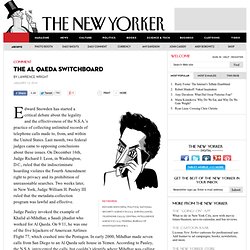
Last month, two federal judges came to opposing conclusions about these issues. On December 16th, Judge Richard J. Leon, in Washington, D.C., ruled that the indiscriminate hoarding violates the Fourth Amendment right to privacy and its prohibition of unreasonable searches. Two weeks later, in New York, Judge William H. Pauley III ruled that the metadata-collection program was lawful and effective. Judge Pauley invoked the example of Khalid al-Mihdhar, a Saudi jihadist who worked for Al Qaeda. If he is right, advocates of extensive monitoring by the government have a strong case. In August, 1998, truck bombs destroyed two American Embassies, in Kenya and Tanzania, killing two hundred and twenty-four people. Yes, the F.B.I. could have stopped 9/11. Edward Snowden to broadcast Channel 4's alternative Christmas Day message. Edward Snowden, the whistleblower who prompted a worldwide debate when he leaked a cache of top secret documents about US and UK spying, has recorded a Christmas Day television message in which he calls for an end to the mass surveillance revealed by his disclosures.
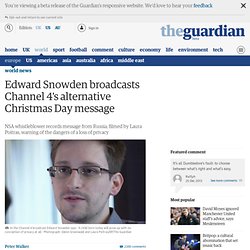
The short film was recorded for Channel 4, which has 20-year history of providing unusual but relevant figures as an alternative to the Queen's Christmas message shown by other UK broadcasters. It will be Snowden's first television appearance since arriving in Moscow. The address, broadcast at 4.15pm on Christmas Day, was filmed in Russia – where Snowden is living after being granted temporary asylum – by Laura Poitras, a film-maker who has closely collaborated with him on the NSA stories. Snowden said George Orwell "warned us of the danger of this kind of information" in his dystopian novel, 1984. "A child born today will grow up with no conception of privacy at all.
NZ man 'stopped at airport because he attended Snowden meeting' Welcome to our hub for all Edward Snowden, NSA and GCHQ-related developments around the world. As arguments rage over how much of our day to day life should be monitored in the name of security, we'll be tracking the growing global debate about privacy in the digital age. We'd like to know what you think about the whole NSA story, what you're worried about – and any new areas you'd like to read more about. NZ man 'stopped at airport because he attended Snowden meeting' Guardian Australia fiercely defends its reporting on spy agencies. In the past three weeks, Guardian Australia has published two influential news reports based on the NSA documents leaked by Edward Snowden.
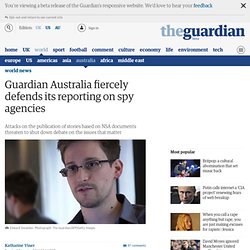
The first, on 18 November, in partnership with the ABC, revealed that Australia’s spy agencies had targeted the mobile phone of the Indonesian president and his wife. The second, published on 2 December, revealed that Australia’s spy agencies had offered to share data about ordinary citizens. In light of the extraordinary level of media attention in these stories, I wanted to make a few points. 1.
The Guardian firmly believes these stories are in the public interest There is much at stake here: fundamental questions about the kind of society we want to live in, the kind of privacy we want to enjoy as citizens and as a community, and the kind of oversight and remit we want our security services to have. Snowden shared documents with journalists in four countries on three continents. NSA files decoded: Edward Snowden's surveillance revelations explained.
Two factors opened the way for the rapid expansion of surveillance over the past decade: the fear of terrorism created by the 9/11 attacks and the digital revolution that led to an explosion in cell phone and internet use.
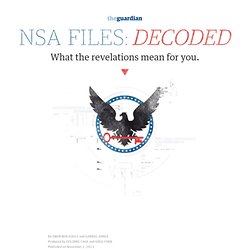
But along with these technologies came an extension in the NSA’s reach few in the early 1990s could have imagined. Details that in the past might have remained private were suddenly there for the taking. Chris Soghoian. NSA files decoded: Edward Snowden's surveillance revelations explained. Two factors opened the way for the rapid expansion of surveillance over the past decade: the fear of terrorism created by the 9/11 attacks and the digital revolution that led to an explosion in cell phone and internet use.
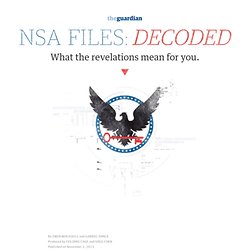
But along with these technologies came an extension in the NSA’s reach few in the early 1990s could have imagined. Details that in the past might have remained private were suddenly there for the taking. Chris Soghoian. The N.S.A. and Your Buddies. Lucian J. Hudson, Director of Communications, The Open University – personal blog. Two things happened this week: it is a safe bet that Sir David Omand will be elevated to the House of Lords within the next year, and his intervention in the Snowden row reveals just how concerned the powers-that-be are that support for Snowden could prove corrosive.
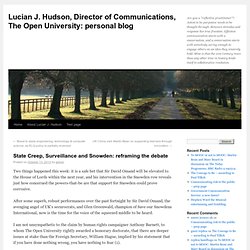
After some superb, robust performances over the past fortnight by Sir David Omand, the avenging angel of UK’s securocrats, and Glen Greenwald, champion of Save our Snowdens International, now is the time for the voice of the squeezed middle to be heard. I am not unsympathetic to the claim by human rights campaigner Anthony Barnett, to whom The Open University rightly awarded a honorary doctorate, that there are deeper issues at stake than the Foreign Secretary, William Hague, implied by his statement that if you have done nothing wrong, you have nothing to fear (1). The choice is not between security and privacy. The National Security Agency: surveillance giant with eyes on America.
The very existence of National Security Agency (NSA) was not revealed for more than two decades after its establishment in 1952, and even now its structure and activities remain largely unknown.
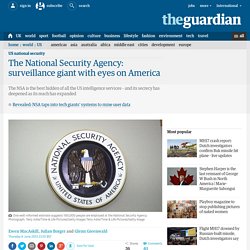
Hence its wry nickname: No Such Agency. Of all the US intelligence services, it is has been the best hidden, and has prided itself on having the fewest leaks – at least until now. How many people does it employ? That is classified. Just how many people does it target? When Harry Truman set up the NSA, it was exclusively aimed at monitoring communications abroad. As technology has evolved, so has the NSA's capacity to intercept an astonishing variety and volume of communications.
"This is not science fiction. Domestic snooping exploded in scale after 9/11, when George W Bush authorised the agency to eavesdrop on Americans without the previous requirement for warrants. They Know Much More Than You Think by James Bamford. The headquarters of the National Security Agency, Fort Meade, Maryland In mid-May, Edward Snowden, an American in his late twenties, walked through the onyx entrance of the Mira Hotel on Nathan Road in Hong Kong and checked in.
He was pulling a small black travel bag and had a number of laptop cases draped over his shoulders. Inside those cases were four computers packed with some of his country’s most closely held secrets.